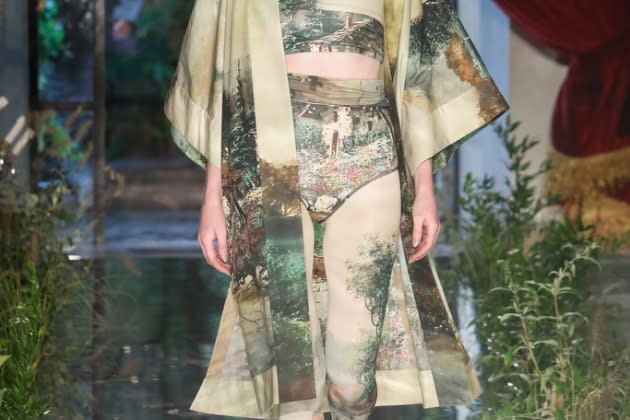Pambianco Study: Antonio Marras New Owner Calzedonia Group Ranks First in Potential IPO 2022 List

MILAN — Calzedonia Group took the top spot this year as the company with the most potential to publicly list, according to Milan-based consultancy Pambianco Strategie di Impresa.
Golden Goose, which ranked first last year, placed second on the list, followed by Giorgio Armani and Valentino.
More from WWD
OTB, which has actually pointed to a potential listing, ranked sixth after St. Barth. Fueled by a strong performance in 2021, the OTB group, which controls Diesel, Jil Sander, Marni, Maison Margiela and Viktor & Rolf, among others, laid out an ambitious plan for the 2022 to 2024 period, and chairman Renzo Rosso has said he was eyeing an IPO in 2024.
The Pambianco ranking analyzes the companies that have the economic, financial and positioning characteristics to be listed in a time span of three to five years, regardless of whether a listing is in the plans of the firm.
Calzedonia Group, founded by Sandro Veronesi, controls the Calzedonia, Intimissimi and Tezenis labels as well as knitwear brand Falconeri, bridal line Atelier Emé and wine retailer Signorvino. In September, it took a majority stake in Antonio Marras.
In the Pambianco report, Calzedonia founder Sandro Veronesi admitted that a listing is “an opportunity we have considered many times, but that we have always postponed.” Aged 63, he said the focus was now on the generational handover as his children increase their responsibilities within the company and on the evolution into a group of brands and companies, allowing each to be more autonomous.
The group is reporting a 20 percent growth in revenues, while margins have been dented by the increase in raw materials costs, energy and shipments.
Europe and Italy remain strong markets, but Veronesi sees growth potential in the still-underdeveloped U.S. and Asia regions. The group will further develop its retail network next year, after opening around 300 stores in 2022.
More attention will be channeled toward the Marras brand, which is “outside of our perimeter, since it’s luxury,” but Veronesi said the acquisition is leveraging Marras, “who has great skills as a designer but did not have a supply chain to support him and that would be up to the level of his label.” Veronesi said he hopes to soon open Marras flagships in the most important cities, starting with Milan.
Golden Goose in 2020 changed hands, as private equity fund Permira bought the Italian brand from the Carlyle Europe Buyout fund. The price was pegged at 1.28 billion euros. The brand, which achieved much of its success with the Superstar sneaker that offers 400 variations a year, continues to be led by chief executive officer Silvio Campara.
Luxury footwear brand Gianvito Rossi, controlled by GGR Srl, ranked seventh, followed by the Max Mara Fashion Group.
Liu Jo was in the 10th spot. As reported, in June the company hired Paola Durante as general manager, a new position for the brand, which signaled a consolidation of the business and potentially a renewed interest in an IPO as its owner Marco Marchi spoke of a listing before the pandemic. Durante was previously director of investor relations and strategic planning at Moncler after a long stint at BofA Merrill Lynch, serving as managing director.
Liu Jo was followed by Dolce & Gabbana. Canali and Missoni closed the listing, ranking 29th and 30th, respectively.
In the fashion small cap listing, Autry ranked first, followed by The Attico and Save the Duck. Autry chief executive officer Mauro Grange said the company sees a listing as premature. The company will close the year with sales of 100 million euros, up 300 percent compared to 2021. The first Autry store will open next year.
In the beauty segment, Veralab, owned by Re-Forme, ranked first, taking over the spot previously held by AGF88 Holding, which controls Fanola and produces professional hair and skin care products, and is now ranked second, followed by Euroitalia in third. The Italian company, which produces and distributes fragrances for Versace, Moschino, Dsquared2 and Missoni, among others, was followed by Davines Spa.
In design, Kartell ranked first, followed by Gessi Holding, and Design Holding, which last year entered into a joint venture with Fendi to create Fashion Furniture Design, or FF Design, to develop the brand’s Casa business.
In the wine segment, Palazzo Antinori with Marchesi Antinori as its main brand, ranked first, followed by Santero Fratelli & C., and Marchesi Frescobaldi.
Pambianco has taken into consideration companies with sales above 50 million euros and for small caps with revenues of between 10 million and 50 million euros.
The consultancy ranked the companies based on seven parameters: percentage growth (in this case in the 2019 to 2021 period); average earnings before interest, taxes, depreciation and amortization percentage in the three-year period; brand awareness; size; exports; distribution control (directly operated stores and e-commerce), and market positioning (high, medium, low).